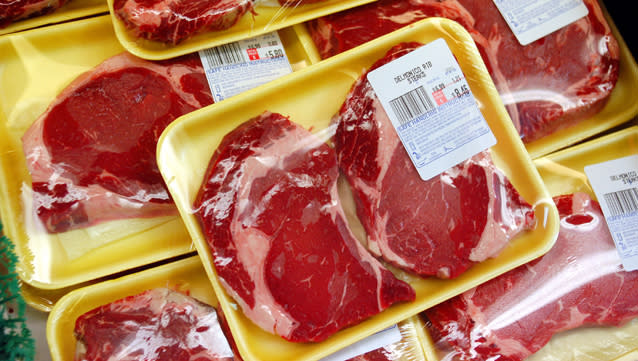Food Labeling Laws: It’s a Matter of ‘When’ Not ‘If’

Starting Saturday, U.S. consumers will know exactly how the cow, pig, chicken or lamb they're eating was slaughtered, raised and even where it was born.
No, this is not an episode of Portlandia. These new labeling laws, referred to as country-of-origin labeling (COOL), were first approved by Congress in 2002. Major U.S. meat processors like Tyson (TSN) and Cargill have been fighting to reverse or amend the rules, arguing that they impose excessive costs on the industry and will reduce the demand for imported meat. More than 2.2 billion pounds of beef -- or 7.7% of the total supply -- was imported into the U.S. in 2012, according to the USDA. Americans consumed 37.3 billion pounds of chicken and 24.6 billion pounds of pork last year that were produced in foreign facilities. Opponents of COOL also include Canada and Mexico, who say the rules unfairly discriminate against their products and will lead to weaker meat exports.
"The costs associated with this new inefficient process will drive some processors dependent on imports out of business and destroy the market for meat from imported livestock," the American Meat Institute said in a complaint to the USDA.
The meat industry has been "willing to fight tooth and nail from allowing COOL on the books," says Colin O'Neil of the Center for Food Safety, one of the groups supporting new labeling laws. "There has been overwhelming support from U.S. businesses but [COOL] was fraught with legal challenges from beginning. Opposition lies in the hands of a small but very powerful group of people."
The fight over meat labeling laws closely mirrors the battles proponents of genetically modified (GMO) foods have experienced in recent years.
Related: Michael Pollan: Genetically Modified Foods Offer Consumers “Nothing”
The majority of Americans support more food transparency -- over 90% of respondents in a Consumers Union survey were in favor of country-of-origin labeling and 93% of Americans support labeling foods that have been genetically engineered according to a recent New York Times poll. Yet efforts to make food products more transparent have been met with steep opposition from some of the nation’s biggest food and seed companies. Measures that would have required genetically modified foods to be labeled in Washington and California were both defeated after opponents such as the National Grocers Association, Monsanto (MON), DuPont (DD) and General Mills (GIS), spent more than $60 million to fight the initiatives.
Related: How Monsanto Controls the Government: Chris Parker
Pro-labeling groups are deciding whether to include a GMO labeling proposal on the Oregon election ballot next year. O'Neil says the recent setbacks have not stopped consumer groups from pursuing these laws at the state and federal levels.
“Consumers want more information, not less, about the products they’re buying and feeding their families,” he points out. “Labeling is not a matter of ‘if’ but a matter of ‘when’."
Tell Us What You Think!
And don't forget to follow us on Twitter and Facebook!
More from The Daily Ticker
Tesla Is on Fire! Consumers Give Model S Highest Rating in Years
Beyond Hedge Fund Trophies: Inside the "Frothy and Toppling" Art Market
Replace Your Wallet with a "Coin"; It's Safer Than a Credit Card, Says CEO
